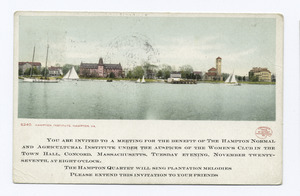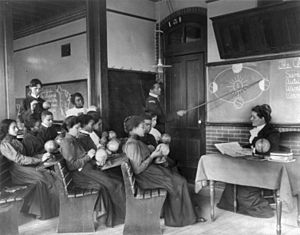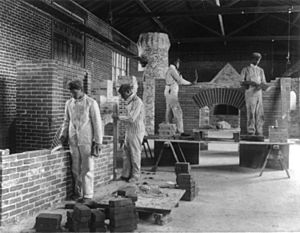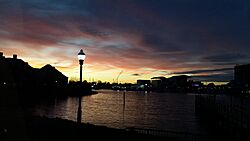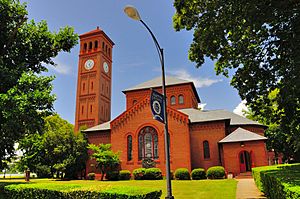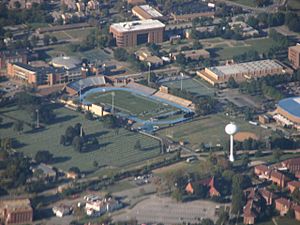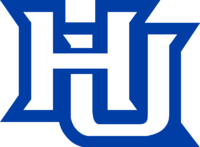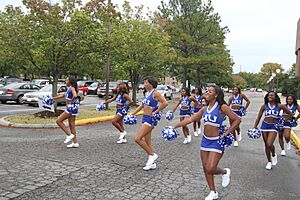Hampton University facts for kids
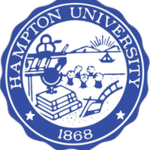 |
|
|
Former names
|
Hampton Normal and Agricultural Institute (1868–1930) Hampton Institute (1930–1984) |
|---|---|
| Motto | "The Standard of Excellence, An Education for Life" |
| Type | Private historically black research university |
| Established | September 17, 1861 |
|
Academic affiliations
|
Space-grant |
| Endowment | $280.6 million (2020) |
| Chancellor | JoAnn Haysbert |
| President | Darrell K. Williams |
| Provost | JoAnn Haysbert |
| Students | 3,516 (fall 2021) |
| Undergraduates | 3,063 (fall 2021) |
| Postgraduates | 453 (fall 2021) |
| Location |
,
U.S.
37°01′21″N 76°20′05″W / 37.02250°N 76.33472°W |
| Campus | Suburban, 314 acres (127 ha) |
| Newspaper | The Hampton Script |
| Colors | Blue & white |
| Nickname | Pirates |
|
Sporting affiliations
|
|
Hampton University is a private university in Hampton, Virginia, USA. It's also a historically black university, meaning it was founded to educate African American students. It started in 1868 as the Hampton Agricultural and Industrial School. It was created by Black and White leaders after the American Civil War to help freedmen (formerly enslaved people) get an education.
The university campus has the Hampton University Museum. This museum is the oldest museum in the United States that focuses on the African diaspora. It is also the oldest museum in Virginia. The first leader of Hampton University was former Union General Samuel Chapman Armstrong. The main campus covers 314 acres in Hampton, Virginia, right by the Hampton River.
Hampton University offers many different study programs. These include 50 bachelor's degrees, 25 master's degrees, and 9 doctoral programs. The university also has a smaller campus in Virginia Beach and offers online classes. Hampton University is home to 16 research centers. One of these is the Hampton University Proton Therapy Institute. This is the largest stand-alone facility of its kind in the world. Hampton University is known for its high level of research activity.
Contents
University History: A Journey Through Time
The university campus was built on land once called "Little Scotland." This was a former plantation in Elizabeth City County. It overlooked Hampton Roads, a famous waterway. It was also close to Fortress Monroe and the Grand Contraband Camp. This camp was a safe place for formerly enslaved men and women during the Civil War.
In 1861, the American Missionary Association (AMA) saw that former slaves needed education. They hired Mary Smith Peake as the first teacher at the camp. She had already been secretly teaching enslaved and free Black people. She started teaching for the AMA on September 17, 1861. She often taught her students under a large oak tree. In 1863, the Emancipation Proclamation was read under this tree. This was the first place in the Confederate states where it was read. From then on, the big tree was called the Emancipation Oak. This tree is now a symbol of both the university and the city. It is part of the university's National Historic Landmark District.
The Hampton Agricultural and Industrial School was founded in 1868. It was later called the Hampton Institute. It was started by leaders from both Black and White communities. These leaders were mainly ministers from the Congregational and Presbyterian churches. The first leader was former Union General Samuel Chapman Armstrong. A very famous student from this school was Booker T. Washington. He became a well-known educator. He was hired as the first principal at the Tuskegee Institute, which he helped grow for many years.
Civil War and the Path to Freedom
During the American Civil War (1861–1865), Fortress Monroe was held by the Union Army. It became a safe place for enslaved people seeking freedom. The commander, General Benjamin F. Butler, said they were "contraband of war." This protected them from being returned to their enslavers. Many people sought freedom behind Union lines. So, the Army built the Grand Contraband Camp nearby. They used materials from the burned ruins of Hampton. This area was later known as "Slabtown."
Hampton University's story begins with Mary S. Peake. In 1861, she started teaching outdoor classes for freedmen. She taught them under the famous Emancipation Oak. In 1863, the Emancipation Proclamation was read to a crowd under this historic tree.
After the War: Training Teachers
After the Civil War, a school to train teachers was officially started in 1868. It was called a normal school. Former Union General Samuel C. Armstrong became its first principal. The new school was built on the land of a former plantation called "Little Scotland." It had a view of Hampton Roads. The first school buildings faced the Hampton River. In 1870, it was officially recognized as a land grant school. It was first known as the Hampton Normal and Agricultural Institute.
Like other historically black colleges, Hampton received a lot of money after the Civil War. This money came from the American Missionary Association and other church groups. It also came from former Union Army officers and soldiers. General William Jackson Palmer was one of many Civil War veterans who gave a lot of money to the school. He was a Union cavalry commander from Philadelphia. He later built a railroad and founded Colorado Springs, Colorado. The Palmer Hall building on campus is named after him.
In 1872, Thomas P. Fenner was hired to create the Hampton Singers. This was because the Fisk Jubilee Singers had been very successful. Armstrong hoped a similar choir at Hampton could also raise money. Fenner and the choir toured widely. They raised enough money to build Virginia Hall. This was the first dormitory for women at Hampton Institute. The choir's fundraising in the 1870s helped the school's finances and kept it from closing.
Sam Armstrong wanted to teach skills that would help Black people support themselves. He wanted to teach "the head, the heart, and the hands." This meant teaching academics, good values, and practical skills.
After ten years, the school had taught 927 students. 277 of them had graduated. Almost all of the graduates became teachers. Many bought land and built homes. Some farmed and taught, while others started businesses. By 1888, over 600 students had graduated. Three-fourths of them were teaching. It was estimated that 15,000 children were taught by Hampton's students and alumni that year.
After Armstrong passed away, Hampton's leaders continued to find supporters. By 1900, Hampton was the richest school for African Americans. This was because it was very good at raising money.
Hampton also had the only library school in the U.S. for Black librarians. The Hampton Institute Library School opened in 1925. It trained 183 Black librarians. The library school closed in 1939.
Booker T. Washington: Spreading Education
One of Hampton's first students was Booker T. Washington. He arrived from West Virginia in 1872 when he was 16. He worked his way through Hampton. After graduating, he became a teacher there. In 1881, Armstrong suggested Washington to a small school in Tuskegee, Alabama. Washington, then 25, went there to make it a strong teacher-training school.
This new school became Tuskegee University. Washington followed Armstrong's ideas. He made Tuskegee a big school and became famous as an educator and speaker. He worked with Julius Rosenwald, a kind person who gave money to good causes. They created a plan for rural Black schools. Rosenwald set up a fund that helped build over 5,000 schools for rural Black children, mostly in the South. In 1888, Washington asked his Hampton classmate Charles W. Greene to lead Tuskegee's Agriculture Department. They also convinced George Washington Carver to join the faculty in 1896.
Carver was very good at agriculture. In 1900, Washington asked Greene to create a business area in Tuskegee. This area would show that Black people could own and run successful businesses. This project, called Greenwood, started in 1901. It was a model for Black-owned business and living areas in cities across the nation. After Washington visited Tulsa, Oklahoma, in 1905, the people there followed the Tuskegee model. They named Tulsa's Black-owned district "Greenwood" in 1906.
Native American Students
In 1878, Hampton started a program for Native Americans. This was to help men who had been prisoners of war. In 1875, after the American Indian Wars, the U.S. Army sent 72 warriors from different tribes to prison in St. Augustine, Florida. Lieutenant Richard Henry Pratt was in charge of them. He started to teach them English and American culture.
Many visitors to St. Augustine became interested in the Native Americans. They volunteered to teach them. Some of the men created beautiful art, now called ledger art. Some of their artwork is kept at the Smithsonian Institution.
When the warriors were released, Pratt convinced 17 of the younger men to study at Hampton Institute. He also brought in more Native American students. A total of 70 Native Americans, young men and women from different tribes, joined the first class. Some people hoped that having Native American students would help locals accept the school's Black students. The Black students were also supposed to help the Native American students learn about American society.
In 1923, the Native American program ended. This was due to disagreements about different races mixing. Native Americans stopped sending their boys to the school. This was because some employers fired Native American men who had been educated with Black students.
Changes, Growth, and Community
Hampton Normal and Agricultural Institute became simply Hampton Institute in 1930. In 1931, the George P. Phenix School opened for all age groups. A new nurses' training school was added to the Dixie Hospital. In 1945, Viktor Lowenfeld, an art educator, joined the Hampton faculty. He later became the head of the Art Department. By 1971, the university offered 42 evening classes. These included "Educational Psychology" and "Playwriting." Tuition was $30 per semester hour.
In 1951, a 20-year-old student named Benjamin Leroy Wigfall made history. He became the youngest person to have a painting bought by the Virginia Museum of the Fine Arts. The painting was called "Chimneys."
With more departments and graduate programs, it became Hampton University in 1984. The university is located in the City of Hampton. The City of Hampton uses the Emancipation Oak on its official seal. From 1960 to 1970, Jerome H. Holland, a famous diplomat and educator, was president of Hampton Institute.
In 2018, Hampton University students held a protest. They wanted the school to address concerns about food quality and living conditions. The university said it was working to fix these issues.
In July 2020, MacKenzie Scott, a generous giver, donated $30 million to Hampton. This was the largest single gift in Hampton's history. The university president will decide how to use the money.
In June 2022, William R. Harvey retired after 43 years as president. He was the longest-serving president in Hampton's history. Darrell K. Williams, a 1983 Hampton graduate, became the new president.
University Presidents
- Samuel Chapman Armstrong (1868 to 1893)
- Hollis B. Frissell (1893 to 1917)
- James Edgar Gregg (1918 to 1929)
- George Perley Phenix (1930)
- Arthur Howe (1930 to 1940)
- Malcolm Shaw MacLean (1940 to 1943)
- Ralph P. Bridgeman (1944 to 1948)
- Alonzo G. Morón (1949 to 1959)
- Jerome H. Holland (1960 to 1970)
- Roy Davage Hudson (1970 to 1976)
- Carl McClellan Hill (1977 to 1978)
- William R. Harvey (1978 to 2022)
- Darrell K. Williams (2022 to present)
Campus Life and Landmarks
The campus has several important buildings. These are part of its National Historic Landmark district. They include Virginia-Cleveland Hall, Wigwam building, Academy Building, Memorial Chapel, and the President's Mansion House.
The original High School on campus became Phenix Hall. This happened when Hampton City Public Schools opened a new Phenix High School in 1962.
The Hampton University Museum started in 1868. It is the oldest African-American museum in the nation. The museum has over 9,000 pieces of art and history.
Hampton University has 16 research centers. The Hampton University Proton Therapy Institute is the largest of its kind in the world.
There are four libraries on campus. These are the William R. and Norma B. Harvey Library (the main one), the William H. Moses Jr. Architecture Library, the Music Library, and the Nursing Library.
The National Geographic Society called the Emancipation Oak one of the 10 great trees in the world.
The campus is on the waterfront, near the mouth of the Chesapeake Bay.
National Historic Landmark District
A 15-acre part of the campus along the Hampton River is a U.S. National Historic Landmark District. This area includes many of the older buildings. Some of these buildings are:
- Mansion House, the original home of the Little Scotland plantation.
- Virginia Hall, built in 1873.
- Academic Hall.
- Wigwam.
- Marquand Memorial Chapel, a red brick chapel with a 150-foot tower.
Cleveland Hall, Ogden, and the Administration building are also part of this historic district. The district was added to the National Register of Historic Places in 1969. It was named a National Historic Landmark in 1974.
Student Population
In 2023, almost two-thirds of Hampton students were women. About 97% of students identified as Black. 20% of students were from Virginia. 68% of students received financial help based on their needs. The average scholarship for first-year students was $10,025.
Academics and Learning
Hampton University has several schools and colleges:
- School of Engineering and Technology
- School of Pharmacy
- James T. George School of Business
- Scripps Howard School of Journalism and Communication
- School of Nursing
- School of Liberal Arts and Education
- School of Religion
- School of Science
- University College
- College of Virginia Beach
- Graduate College
As of 2020, Hampton offers 50 bachelor's programs, 26 master's programs, and seven doctoral programs. It also has two professional programs and ten associate/certificate programs.
The Freddye T. Davy Honors College is for high-achieving undergraduate students. It offers special learning chances and benefits. Students can join by invitation or by applying.
Hampton University is often ranked among the top ten HBCUs in the nation. U.S. News & World Report ranks it among "National Universities."
Hampton has a student to faculty ratio of 10 to 1. This means there are 10 students for every teacher. This is better than the national average of 18 to 1.
Hampton is the first and only HBCU to fully control a NASA Mission.
The Alumni Factor named Hampton one of the seven best colleges in Virginia.
Hampton University is known as a selective admissions institution. This means it chooses its students carefully.
Student Activities and Sports
Athletics: The Hampton Pirates
Hampton sports teams play in NCAA Division I. Their football team is in the FCS. They are part of the Coastal Athletic Association (CAA). They joined the CAA in 2022. Hampton is one of only three NCAA Division I HBCU schools not in the Mid-Eastern Athletic Conference or Southwestern Athletic Conference.
In 2016, Hampton became the first and only HBCU to have a Division I men's lacrosse team. ESPN even broadcast from the campus before their first game.
Hampton is the only HBCU with a competitive sailing team.
In 2001, the Hampton men's basketball team won its first NCAA tournament game. They beat Iowa State 58–57. This was one of the biggest upsets ever in the tournament. They were only the fourth team seeded 15th to beat a 2nd seed. They returned to the tournament in 2002, 2006, 2011, 2015, and 2016. Their NCAA tournament record is 2 wins and 6 losses.
The "Lady Pirates" basketball team has also played in the NCAA tournament many times. In 1988, when they were a Division II school, the Lady Pirates won the NCAA Women's Division II Basketball Championship. In 2011, they almost beat Kentucky in overtime. In 2015, they played in the Women's NIT. They won their first game but lost the second.
The Pirates football team won their conference title in 1997. They shared the title in 1998 and 2004. They won it again by themselves in 2005 and 2006. From 2004 to 2006, they won three MEAC Championships. They were also ranked in the Division I FCS top 25 poll each year. In 2007, five Pirates players went to the NFL Combine. This was the most from any FCS school that year. They have also been very good at tennis.
Major rivals for Hampton include Norfolk State University and Howard University. In 2019, Hampton restarted its rivalry with Virginia Union University.
Student Organizations
There are over 55 student groups on campus. These groups focus on arts, sports, community service, leadership, religion, and student government.
"The Marching Force" Marching Band
The "The Marching Force" Marching Band supports Pirate athletics. The band has performed at important events. This includes a Barack Obama Presidential Inauguration parade in Washington, D.C. "The Force" was chosen to represent Virginia in the parade. The band also includes the "Ebony Fire" all-women danceline, "Silky" (the flag team), and "Shimmering Sapphire Elegance" (the majorette team).
Greek Life
Hampton University has over 15 Greek letter organizations. These include groups from the National Pan-Hellenic Council.
Famous People Who Attended Hampton
Business Leaders
- Robert S. Abbott (1896) – Started The Chicago Defender newspaper.
- Rashida Jones (2002) – President of MSNBC.
- Charles Phillips (1986) – Former CEO of Infor and President of Oracle Corporation.
- Percy Sutton – Co-founder of Inner City Broadcasting Corporation.
Educators
- St. Clair Drake (1931) – Sociologist who created the first African and African American studies program at Stanford University.
- Freeman A. Hrabowski III (1969) – President of the University of Maryland, Baltimore County.
- Robert Russa Moton (1890) – President Emeritus of Tuskegee University.
- Booker T. Washington (1875) – Famous educator, author of Up from Slavery, and first president of Tuskegee Institute.
Entertainment, Media, and Arts
- Ruth E. Carter (1982) – Academy Award-winning costume designer for Black Panther.
- Spencer Christian – Former weatherman for Good Morning America.
- Brian Custer (1993) – Sports broadcaster for ESPN and Showtime.
- DJ Envy (1999) – Radio Hall of Fame disc jockey and host of The Breakfast Club.
- Javicia Leslie (2009) – Actress, known for Batwoman.
- Wanda Sykes (1986) – Emmy Award-winning actress, comedian, and writer.
Politics and Government Leaders
- Allyson Kay Duncan (1972) – U.S. Circuit Court Judge.
- Frankie Muse Freeman (1936) – Civil rights attorney; first woman on the U.S. Commission on Civil Rights.
- Tishaura Jones (1994) – First Black female mayor of St. Louis.
- Sylvia Trent-Adams (1987) – First African-American nurse to serve as Surgeon General of the United States.
Science, Health Care, Technology, Engineering, and Mathematics
- Moogega Cooper (2006) – Engineer and Lead of Planetary Protection for the Mars 2020 Mission at NASA's Jet Propulsion Laboratory.
- Christine Darden (1962) – NASA mathematician and engineer, featured in Hidden Figures.
- Mary Jackson (1942) – NASA's first Black female engineer, also featured in Hidden Figures.
- Susan La Flesche Picotte (1886) – First Native American physician.
Sociology and Humanities
- Septima Poinsette Clark (1946) – Known as the "Queen mother" of the Civil Rights Movement.
- Alberta Williams King (1924) – Mother of Martin Luther King Jr.
Sports Stars
- Rick Mahorn (1980) – Former NBA player.
- Francena McCorory (2010) – Two-time Olympic gold medalist in track.
- Mo'ne Davis (2023) – Famous participant in the 2014 Little League World Series.
See also
 In Spanish: Universidad de Hampton para niños
In Spanish: Universidad de Hampton para niños
- Emancipation Oak, historic tree on the campus
- WHOV 88.1 FM
 | Emma Amos |
 | Edward Mitchell Bannister |
 | Larry D. Alexander |
 | Ernie Barnes |


